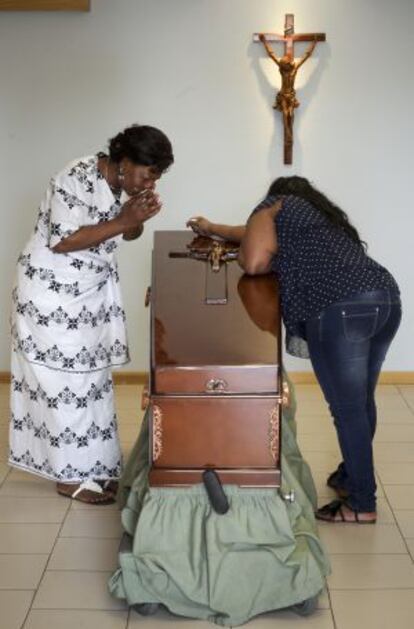Family of immigrant who died with undiagnosed AIDS fights for justice
Relatives of Congolese woman claim medical negligence at internment center

It was a case of the right arm not knowing what the left arm was doing. The medical team at the Aluche immigrant internment center in Madrid was unaware that Samba Martine, a 34-year-old Congolese woman who died there on December 19, 2011, had the HIV virus. Yet the heads of the temporary immigrant detention center in Melilla, where she was originally taken after her long journey to Spain, had tested her for AIDS. Two months before she was transferred to Madrid and three months before she died, the Melilla center found out that the test results were positive and that her condition was very serious.
This lack of coordination between both centers is relevant, because experts consulted by this newspaper feel that Samba¡¯s death could have been avoided. Before passing away, the woman made use of the Madrid center¡¯s health services up to 10 times, yet the physicians disregarded the severity of the pain she was experiencing. The Congolese migrant was treated for perianal itching, coughing, chest pain, flu symptoms and persistent headaches, among other ills, yet she was only taken to a hospital on the same day of her death. Had her condition been known, more careful medical treatment could have been dispensed.
In October, a Madrid court dismissed the charges of medical negligence brought by the victim¡¯s mother, Clementine Nijba, and did not consider that it was the doctors¡¯ duty to have tested Samba for AIDS. Her mother appealed to the High Court and filed a complaint with the government, demanding compensation for the malfunctioning of state agencies. It was then that Nijba produced the AIDS test practiced on Samba at the Melilla center.
As further evidence, Nijba presented a report by Concepci¨®n Colomo, a doctor specializing in AIDS and sexually transmitted diseases, who states that Samba also had advanced anemia and a very low white blood cell count, putting her at great risk of contracting bacterial, viral or fungal infections. ¡°Samba Martine¡¯s immunodeficiency was left untreated, exposing her to contracting an opportunistic infection, which is ultimately what happened, resulting in her death,¡± explains Colomo in her report.
Jos¨¦ Ram¨®n Arribas, an HIV specialist at La Paz hospital in Madrid who has no ties to the case, said that Samba¡¯s test results suggest she should have seen a doctor a few days later even if she did not present any outward symptoms. ¡°In that condition, any other symptom must be taken really seriously because it could be caused by severe infections,¡± he explains. Strong, persistent headaches or chest pain, which Samba complained of days before her death, are among those particularly relevant symptoms for advanced cases.
¡°Cryptococcosis, the disease she died of, is typical of AIDS patients, especially those from Africa, and headaches are one of the symptoms,¡± says Arribas, adding that it is ¡°perfectly treatable.¡±
The Ombudsman has opened an investigation after detecting the absence of coordination protocol between the medical services at both centers ¡ª one answers to the Interior Ministry, the other to the Labor Ministry.
Who knows whether in Samba¡¯s case, a better exchange of information between agencies might have saved her life.
Spain failing in healthcare stakes
Teresa is a 22-year-old from Cuba who lives in Tenerife without residency papers. She is diabetic and when she found out she was pregnant, she went to her local health center, but was denied assistance because of her illegal status. The NGO M¨¦dicos del Mundo took charge of the situation, and filed complaints with health authorities. A few weeks later, the health department issued an apology and promised to treat Teresa.
Hers is not an isolated case. M¨¦dicos del Mundo says that Spanish health authorities are often stricter than the law when it comes to restricting access to undocumented migrants. Since September, illegal immigrants can no longer get free healthcare, except for emergency treatment.
¡°Spain has become our worst example, when in prior reports we always held it up as a role model of universal healthcare,¡± says Michel Degueldre, president of M¨¦dicos del Mundo in Belgium. The NGO blames austerity measures for stripping healthcare from the most vulnerable members of society. In Spain, 62 percent of patients treated by M¨¦dicos del Mundo had been rejected by the public health system. This rate is three times higher than the average, which considers figures in Spain, Belgium, France, Greece, Germany, Holland and the UK.
¡°The increase in co-payment for prescription drugs and the exclusion of immigrants is causing a shift in the Spanish model from universal healthcare to an insurance model,¡± said ?lvaro Gonz¨¢lez, president of the organization in Spain.
Tu suscripci¨®n se est¨¢ usando en otro dispositivo
?Quieres a?adir otro usuario a tu suscripci¨®n?
Si contin¨²as leyendo en este dispositivo, no se podr¨¢ leer en el otro.
FlechaTu suscripci¨®n se est¨¢ usando en otro dispositivo y solo puedes acceder a EL PA?S desde un dispositivo a la vez.
Si quieres compartir tu cuenta, cambia tu suscripci¨®n a la modalidad Premium, as¨ª podr¨¢s a?adir otro usuario. Cada uno acceder¨¢ con su propia cuenta de email, lo que os permitir¨¢ personalizar vuestra experiencia en EL PA?S.
?Tienes una suscripci¨®n de empresa? Accede aqu¨ª para contratar m¨¢s cuentas.
En el caso de no saber qui¨¦n est¨¢ usando tu cuenta, te recomendamos cambiar tu contrase?a aqu¨ª.
Si decides continuar compartiendo tu cuenta, este mensaje se mostrar¨¢ en tu dispositivo y en el de la otra persona que est¨¢ usando tu cuenta de forma indefinida, afectando a tu experiencia de lectura. Puedes consultar aqu¨ª los t¨¦rminos y condiciones de la suscripci¨®n digital.








































